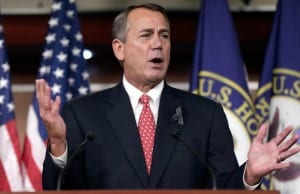U.S. House Passes Budget Deal; Senate Likely to Follow Suit
Democrats finally scored a victory in the U.S. House of Representatives on Thursday, joining Republicans to pass the Bipartisan Budget Act by a stunning margin of 332-94.
The unanticipated truce in the neverending battle among House members pushes the bill to the Senate floor, where passage is likely and would avoid another tedious holiday budget crisis. President Obama is expected to sign the bill as soon as it reaches his desk, which would avoid a government shutdown in January.
It was a significant victory not just for Democrats, but also Republican House Speaker John Boehner, who crushed opposition to the bill from Tea Party members, then bashed the lobbying groups that support that side of the Republican Party.
Conservative Groups Prodded
“Frankly, I think (Tea Party lobbying groups) are misleading their followers,” Boehner said during his weekly news briefing. “I think they’re pushing our members in places where they don’t want to be. Frankly, I just think that they’ve lost all credibility.”
That was a direct swipe at conservative groups like Heritage Action for America, Americans for Prosperity, Freedom Works and Club for Growth, which all voiced loud opposition to the bill crafted by Republican Budget Committee leader Paul Ryan, R-Wis., and Senate Budget Committee leader Patty Murray, D-Wash.
The bill is a rarity in that it represents a compromise agreement that both sides can love and hate equally. Republicans supported the bill 169-62, while Democrats favored it 163-32.
Good and Bad for Both Sides
Some of the key parts of the bill include:
- Discretionary spending is up slightly to $1.01 trillion, about $35 billion more than House Republicans wanted and $4 billion less than Democrats asked for.
- There will be $63 billion in sequester relief over the next two years, half for Defense, half for non-Defense agencies. The relief will be paid for by raising fees on airline tickets about $6 a ticket; making federal workers pay more of their pension costs; and extending a 2 percent cut to Medicare.
- The bill will reduce the deficit by $23 billion, which represents a pittance considering the federal deficit is now $17.3 trillion.
- There will be no extension of jobless benefits to 1.3 million unemployed people whose benefits expire Jan. 1.
- Cost of living adjustments (COLA) for some military retirees was reduced.
Senators Likely to Grumble, then Pass Bill
The deal may stumble for a day or two in the Senate, where Republicans already are grumbling about sequester cuts and Democrats are whining about failure to extend unemployment benefits. Republican Sens. Ted Cruz of Texas, Lindsey Graham of South Carolina and Marco Rubio of Florida already have voiced opposition to the bill.
If it does get through, it will end the possibility of another government shutdown. The 15-day shutdown in October cost the economy $24 billion and lowered public support for Washington politicians even more.
Murray and Ryan, who arrived at an accord in surprisingly quick fashion, said they expect their peers in the Senate to follow suit.
“This agreement breaks through the recent dysfunction to prevent another government shutdown and roll back sequestration’s cuts to Defense and domestic investments in a balanced way,” Murray said. “It’s a good step in the right direction that can hopefully rebuild some trust and serve as a foundation for continued bipartisan work.”
“I’m proud of this agreement,” Ryan said. “This bill doesn’t go nearly far enough, but in a divided government, you don’t get everything you want. You have to work with the other side and when you get the chance to take a step forward — however small — you take it.”
Sources:
- Kane, P., O’Keefe, E. (2013, December 12). Boehner attacks tea party groups as House approves budget deal. Washington Post. Retrieved from http://www.washingtonpost.com/politics/boehner-escalates-feud-with-conservative-groups-as-vote-on-budget-bill-looms/2013/12/12/3986871c-634f-11e3-91b3-f2bb96304e34_story.html?hpid=z1
- Walsh, D., Bash, D., Cohen, T. (2013, December 12). House approves budget deal aimed t averting shutdown. CNN.com. Retrieved from http://www.cnn.com/2013/12/12/politics/congress-budget/
- Weisman, J., Peters, J. (2013, December 12). House Passes Budget Pact and Military Abuse Protections, but Not Farm Bill. New York Times. Retrieved from http://www.nytimes.com/2013/12/13/us/politics/house-budget-vote.html








